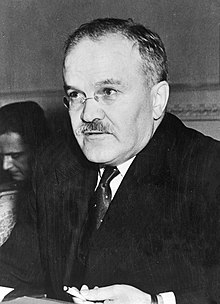

Chairman of the Council of People's Commissars of the Soviet Union
Vyacheslav Mikhailovich Skryabin 9 March 1890 Kukarka, Russian Empire
8 November 1986(1986-11-08) (96) Moscow, Russian SFSR, Soviet Union
19 December 1930 – 6 May 1941
Soviet politician This article is about the Soviet politician. For other uses, see Molotov (disambiguation). In this Eastern Slavic naming convention, the patronymic is Mikhailovich and the family name is Molotov. Vyacheslav Mikhailovich Molotov (/ˈ m ɒ l ə t ɒ f , ˈ m oʊ -/ ; né Skryabin; (OS 25 February) 9 March 1890 – 8 November 1986) was a Russian politician and diplomat, an Old Bolshevik, and a leading figure in the Soviet government from the 1920s onward. He served as Chairman of the Council of People's Commissars from 1930 to 1941 and as Minister of Foreign Affairs from 1939 to 1949 and from 1953 to 1956. Born in Kukarka, Molotov joined the Russian Social Democratic Labour Party (RSDLP) in 1906, supported Vladimir Lenin's Bolshevik faction, and was twice arrested and exiled for revolutionary activities. As an editor of Pravda, Molotov opposed Alexander Kerensky's Provisional Government after the February Revolution of 1917. He later became a member of the Petrograd Military Revolutionary Committee and there helped to plan the October Revolution, which brought the Bolsheviks to power. After the revolution, Molotov worked in Ukraine before he was recalled to Moscow in 1921, where he became a full member of the Central Committee. A staunch supporter and protégé of Joseph Stalin, Molotov achieved greater prominence following Lenin's death and Stalin's rise to power. Molotov was made a full member of the Politburo in 1926, appointed First Secretary of the Moscow Communist Party in 1928, and became the Chairman of the Council of People's Commissars (Premier of the Soviet Union) in the 1930. In the latest capacity, Molotov oversaw collectivisation of the Soviet Union's agricultural sector and the implementation of the First Five-Year Plan. He played a central role during the Great Purge in the 1930s by signing 373 execution lists, more than any other Soviet official including Stalin. He would later justify his role in the purge by stating that it was excessive at times but that the party needed to be purged of reactionary elements. Molotov was appointed People's Commissar for Foreign Affairs in May 1939 and in August became the principal Soviet signatory of the German–Soviet non-aggression pact, also known as the Molotov–Ribbentrop Pact. During World War II (called the Great Patriotic War), Molotov was the deputy chairman of the State Defense Committee. He helped to negotiate the Anglo-Soviet Treaty of 1942, a Lend-Lease treaty with the United States the same year, and accompanied Stalin to the 1943 Tehran Conference, the 1945 Yalta Conference and the Potsdam Conference that year after the German defeat. He also represented the Soviet Union that year at the San Francisco Conference, which led to the creation of the United Nations. After the war, he became noted in the West for his diplomatic skills and general hostility. Molotov retained his place as a leading Soviet diplomat and politician until March 1949, when he fell out of Stalin's favour and lost the foreign affairs ministry leadership to Andrei Vyshinsky. Molotov's relationship with Stalin deteriorated further, and Stalin criticised Molotov in a speech to the 19th Party Congress. Molotov was reappointed Minister of Foreign Affairs after Stalin's death in 1953 but staunchly opposed Nikita Khrushchev's de-Stalinization policy, which resulted in his eventual dismissal from all positions and expulsion from the party in 1961. Molotov defended Stalin's policies and legacy until his death in 1986 and harshly criticised Stalin's successors, especially Khrushchev. The Molotov cocktail is named after him.

We use cookies
We use cookies and other tracking technologies to improve your browsing experience on our website, to show you personalized content and targeted ads, to analyze our website traffic, and to understand where our visitors are coming from. Privacy Policy.